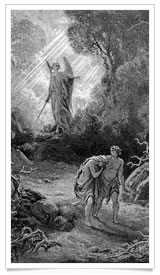by Rev. Jared Melius

A new practice in Lutheranism that has become popular quickly is the Service of the Imposition of Ashes conducted on Ash Wednesday. The sign of the cross is smeared upon the forehead while the words of Gen. 3:19 are repeated: “Remember that you are dust, and to dust you shall return.”
The whole thing is chilling. Every participant, pastor and children included, is marked with ashes and pronounced mortal. This might be considered a preaching of the Law, since death is a preaching of the Law. But perhaps it’s not entirely. Consider Gen. 3:19 in its context. Read Gen. 2:15–17. What are the consequences of eating from the tree?
_____________________________________
_____________________________________
The Bible says plainly, “in the day you eat of it you shall surely die.” Adam ate the fruit. The day he ate it—that very moment—he died spiritually. Nevertheless, he did not die physically. He lived. This should come as a surprise because every breath that Adam takes comes from God (Col. 1:16–17). He should have died the moment he forsook God. Why didn’t he?
_____________________________________
_____________________________________
God forgave him for the sake of Jesus Christ’s death on the cross. Adam lived because of Jesus. This is the content of the most important promise in the Old Testament (Gen. 3:15), given immediately after the Fall. God promised Adam that the devil’s work will not stand, that his head will be crushed by the Seed of the woman. Adam is forgiven.
Then God says to Adam, “By the sweat of your brow you will eat your food until you return to the ground, since from it you were taken; for dust you are and to dust you shall return.” Wasn’t the devil’s work supposed to be defeated? Wasn’t the penalty to be paid by the Seed of the woman? Is this punishment?
It’s not. Adam is a Christian; he believes the promises of the Gospel (Gen. 3:15). Thus, the following verses, which apply to all Christians, apply also to Adam: Rom. 4:8; Rom. 8:33; Is. 50:8, 9; 2 Cor. 5:19 and Ps. 32:2. Discuss what they say.
There is no punishment from God for Christians. The penalty for Adam’s sin is satisfied by the cross. Adam’s body will return to the dust, because even though Adam has the promise of the forgiveness of sins, he is still a sinner. His sin is not held against him, but it’s still there. He is not guilty, and yet, unlike before the Fall, Adam is now conflicted, torn between two different wills. He now wants to love and serve God. But he also still loves and serves himself. Name some of the ways these two wills are described in Rom. 7:14–25 and Gal. 5:16–25.
_____________________________________
_____________________________________
The Bible calls the will characterized by original sin the “old man” or the “sinful nature.” When God gets His way, what happens to the old man in us? Read 1 Cor. 9:27; Rom. 6:6; and Heb. 12:1.
_____________________________________
_____________________________________
The old Adam dies. He makes a start at this by daily contrition and repentance, but the only way to be fully free of him is to kill him and bury him. The dust to which God will return our lowly bodies is something like a refiner’s fire. The old Adam cannot survive it.
Does the old Adam in you still want his way? Does he still com-plain and lust? Give God some time, and that old rattling nuisance will be put to death. You will be free—free to be the person you were created to be and free of your temptations and regrets. Take heart. You are dust, and to dust you shall return.
—
> Did you know? Historically, palm fronds from Palm Sunday are burned and ground up to create the ashes used on ash wednesday.
About the author: Rev. Jared Melius (pastor@mtzionlcms.org) is pastor of Mount Zion Lutheran Church, Denver, Colo.
March 2011



